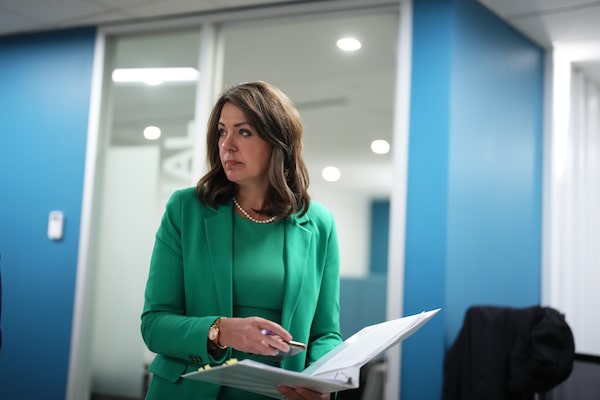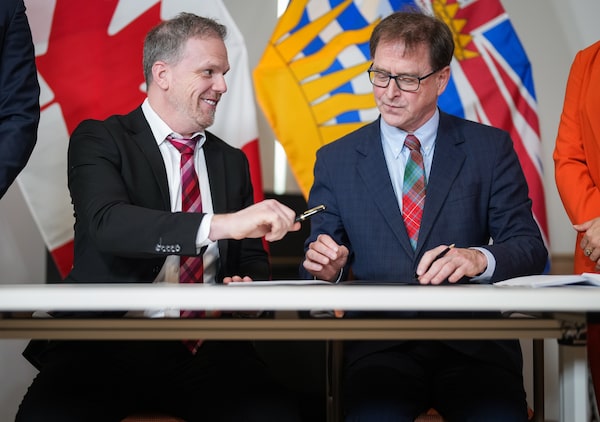Minister of Health Mark Holland speaks about new national pharmacare legislation during a press conference in Ottawa on Feb. 29.PATRICK DOYLE/The Canadian Press
The price tag of a federal pharmacare program is expected to be an estimated $1.5-billion annually, Health Minister Mark Holland said Thursday after tabling legislation that ensures the NDP deal to prop up the minority Liberals will continue.
Mr. Holland, who spoke at an Ottawa community health clinic, said the cost could be subject to change.
“These are moving targets,” he said. “These are obviously not this year expenditures,” adding that the cost will not be included in this year’s budget.
The legislation follows protracted negotiations between the Liberals and the New Democratic Party over a federal pharmacare deal.
Ottawa must now figure out how to implement the program and pass the legislation in a quickly narrowing window before the next election, which must happen by fall 2025. At the same time, the federal government also needs to work with provinces and territories because it cannot deliver the program without their co-operation.
The bill says the minister may – if an agreement has been reached to do so – make payments to a province or territory in order to increase any existing public pharmacare coverage and to provide “universal single-payer” coverage for specific prescription drugs and related products intended for contraception or the treatment of diabetes.
NDP Leader Jagmeet Singh speaks about drug coverage for Canadians, in the Foyer of the House of Commons on Parliament Hill in Ottawa, on Feb. 29.Justin Tang/The Canadian Press
The legislation also says the minister must, no later than 30 days after the bill receives royal assent, establish a committee of experts to make recommendations on options for the operation and financing of “national, universal, single-payer pharmacare.”
NDP Leader Jagmeet Singh first announced last Friday that his party had reached an agreement with the governing Liberals to introduce the first piece of a national pharmacare program. The arrangement keeps alive the supply-and-confidence agreement that has been in place between the two parties since March, 2022, in which the NDP has supported the minority government in exchange for key policy concessions.
Mr. Singh said Thursday that the plan was “historic” and amounted to the realization of a dream for the New Democrats. He said that the NDP forced the government to act.
“This is for all Canadians,” Mr. Singh said, adding that there will be “universal delivery” of both diabetes and contraceptive medications.
Protestors are seen during a rally to demand Canada's public health care system be protected and expanded, on Parliament Hill in Ottawa, on Feb. 7, 2023.Spencer Colby/The Canadian Press
When asked how the NDP can frame the legislation as a win for universal, single-payer pharmacare when there is only coverage for two drug classes, the party’s health critic, Don Davies, told reporters that diabetes and contraceptive medication will be delivered through a single-payer model for the first time.
Mr. Davies said that within a year of the bill passing, there will be an essential-medicines list that will constitute the “next slate of drugs that would be at least on consideration” for an expanded program, should a future government choose to do so.
The plan has already faced opposition from some provincial governments, notably Quebec and Alberta.
This week, Mr. Singh challenged Alberta’s position, saying it is refusing to take action that would save lives and money. But Mr. Singh said the situation is different for Quebec, which he said should be granted a right of withdrawal with full compensation. Still, he urged all provinces to take part in the program because they could use their collective purchasing power to reduce costs for everyone.

Alberta Premier Danielle Smith arrives for a news conference in Ottawa on Feb. 5.Sean Kilpatrick/The Canadian Press
In a statement on social media Thursday, Alberta Health Minister Adriana LaGrange demanded her province’s “fair share” of the pharmacare funding.
When asked Thursday why his position is different with Quebec, Mr. Singh pointed to his party’s Sherbrooke Declaration. The policy commits the NDP to the concept of asymmetrical federalism that it says can be implemented by allowing Quebec to opt out of federal programs “with compensation.”
Quebec’s Health Minister’s office said Thursday that the province will, like it did with the federal dental-care plan, exercise its right to withdraw. The office said that, with full compensation and without conditions, it will be able to improve the existing provincial plan and enhance services according to the needs of Quebeckers.
Manitoba Premier Wab Kinew said that if the federal government is going to come to the table with the resources and investments, his province will “happily work with them.”

Federal Health Minister Mark Holland, left, and B.C. Health Minister Adrian Dix sign a document after a health care funding announcement, in Vancouver, on Feb. 12.DARRYL DYCK/The Canadian Press
Ontario Health Minister Sylvia Jones said her province was still awaiting details about the program. Ms. Jones said Ontario already has a “robust” system in place, particularly for diabetes care.
A Saskatchewan government spokesperson said Thursday that the province “already has one of the most comprehensive drug coverage plans in Canada” and that the provincial government needs more information about a national pharmacare program.
Conservative Leader Pierre Poilievre was asked Thursday whether Quebec, Alberta and any other province should have the right to opt out of the pharmacare plan with full compensation and no conditions.
“We’ll see what the program delivers. Not just nice words, photo ops and agreements between two incompetent politicians,” he said in French. Provinces should have the power to opt out, he added.
With reports from Frédérik-Xavier Duhamel in Montreal, Temur Durrani in Winnipeg, Laura Stone in Toronto, and Bill Curry in Ottawa